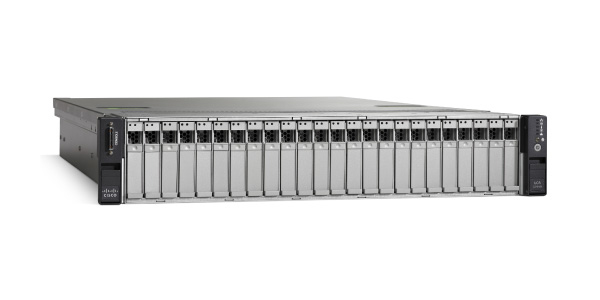Offer details
Related Products
Description
The form-factor-agnostic Cisco® Unified Computing System™ (Cisco UCS™) combines Cisco UCS C-Series Rack Servers and B-Series Blade Servers with networking and storage access in a single converged system that simplifies management and delivers greater cost efficiency and agility with increased visibility and control. The latest expansion of the Cisco UCS portfolio includes the new Cisco UCS C240 M3 Rack Server (two rack units [2RU]) and Cisco UCS C220 M3 Rack Server (1RU) and the Cisco UCS B200 M3 Blade Server. These three new servers increase compute density through more cores and cache balanced with more memory capacity and disk drives and faster I/O. Together these server improvements and complementary Cisco UCS advancements deliver the combination of features and cost efficiency required to support IT's diverse server needs.
The Cisco UCS C240 M3 Rack Server (Figure 1) is designed for both performance and expandability over a wide range of storage-intensive infrastructure workloads, from big data to collaboration. Building on the success of the Cisco UCS C210 M2 Rack Server, the enterprise-class Cisco UCS C240 M3 server further extends the capabilities of the Cisco UCS portfolio in a 2RU form factor with the addition of the Intel® Xeon® processor E5-2600 and E5-2600 v2 product families, which deliver an outstanding combination of performance, flexibility, and efficiency gains. The Cisco UCS C240 M3 offers up to two Intel® Xeon® processor E5-2600 or E5-2600 v2 processors, 24 DIMM slots, 24 disk drives, and four 1 Gigabit Ethernet LAN-on-motherboard (LOM) ports to provide exceptional levels of internal memory and storage expandability and exceptional performance.
The Cisco UCS C240 M3 interfaces with Cisco UCS using another Cisco innovation, the Cisco UCS Virtual Interface Card. The Cisco UCS Virtual Interface Card is a virtualization-optimized Fibre Channel over Ethernet (FCoE) PCI Express (PCIe) 2.0 x8 10-Gbps adapter designed for use with Cisco UCS C-Series Rack Servers. The VIC is a dual-port 10 Gigabit Ethernet PCIe adapter that can support up to 256 PCIe standards-compliant virtual interfaces, which can be dynamically configured so that both their interface type (network interface card [NIC] or host bus adapter [HBA]) and identity (MAC address and worldwide name [WWN]) are established using just-in-time provisioning. In addition, the Cisco UCS VIC 1225 can support network interface virtualization and Cisco® Data Center Virtual Machine Fabric Extender (VM-FEX) technology.
The Cisco UCS C240 M3 Rack Server (Figure 1) is designed for both performance and expandability over a wide range of storage-intensive infrastructure workloads, from big data to collaboration. Building on the success of the Cisco UCS C210 M2 Rack Server, the enterprise-class Cisco UCS C240 M3 server further extends the capabilities of the Cisco UCS portfolio in a 2RU form factor with the addition of the Intel® Xeon® processor E5-2600 and E5-2600 v2 product families, which deliver an outstanding combination of performance, flexibility, and efficiency gains. The Cisco UCS C240 M3 offers up to two Intel® Xeon® processor E5-2600 or E5-2600 v2 processors, 24 DIMM slots, 24 disk drives, and four 1 Gigabit Ethernet LAN-on-motherboard (LOM) ports to provide exceptional levels of internal memory and storage expandability and exceptional performance.
The Cisco UCS C240 M3 interfaces with Cisco UCS using another Cisco innovation, the Cisco UCS Virtual Interface Card. The Cisco UCS Virtual Interface Card is a virtualization-optimized Fibre Channel over Ethernet (FCoE) PCI Express (PCIe) 2.0 x8 10-Gbps adapter designed for use with Cisco UCS C-Series Rack Servers. The VIC is a dual-port 10 Gigabit Ethernet PCIe adapter that can support up to 256 PCIe standards-compliant virtual interfaces, which can be dynamically configured so that both their interface type (network interface card [NIC] or host bus adapter [HBA]) and identity (MAC address and worldwide name [WWN]) are established using just-in-time provisioning. In addition, the Cisco UCS VIC 1225 can support network interface virtualization and Cisco® Data Center Virtual Machine Fabric Extender (VM-FEX) technology.
Specifications
| Processor | |
|---|---|
| Thermal Monitoring Technologies | Yes |
| Thermal Design Power (TDP) | 95 W |
| Tcase | 75 °C |
| Supported instruction sets | AVX |
| Scalability | 2S |
| Processor threads | 20 |
| Processor package size | 52.5 x 45 mm |
| Processor operating modes | 64-bit |
| Processor lithography | 22 nm |
| Processor codename | Ivy Bridge EP |
| Physical Address Extension (PAE) | 46 bit |
| PCI Express configurations | x4, x8, x16 |
| Number of QPI links | 2 |
| Memory types supported by processor | DDR3-SDRAM |
| Memory clock speeds supported by processor | 800,1066,1333,1600,1866 MHz |
| Memory channels supported by processor | Quad |
| Memory bandwidth supported by processor (max) | 59.7 GB/s |
| Maximum number of PCI Express lanes | 40 |
| Maximum internal memory supported by processor | 768 GB |
| Idle States | Yes |
| FSB Parity | No |
| Execute Disable Bit | Yes |
| Embedded options available | No |
| ECC supported by processor | Yes |
| Bus type | QPI |
| Processor cache type | Smart Cache |
| Processor cache | 25 MB |
| Conflict-Free processor | No |
| Processor series | Intel Xeon E5-2600 v2 |
| Processor frequency | 2.2 GHz |
| Processor boost frequency | 3 GHz |
| Number of processors installed | 2 |
| Processor model | E5-2660V2 |
| System bus rate | 8 GT/s |
| Processor socket | LGA 2011 (Socket R) |
| Processor cores | 10 |
| Processor manufacturer | Intel |
| Intelligent Platform Management Interface (IPMI) support | Yes |
| Processor family | Intel® Xeon® E5 V2 Family |
| Memory | |
| Internal memory | 32 GB |
| Memory layout (slots x size) | 2 x 16 GB |
| Memory slots | 24 |
| Memory clock speed | 1866 MHz |
| Internal memory type | DDR3-SDRAM |
| ECC | Yes |
| Storage | |
| Supported storage drive interfaces | SAS, Serial ATA |
| Card reader integrated | Yes |
| Compatible memory cards | SD |
| Hot-swap | Yes |
| Supported HDD sizes | 2.5,3.5" |
| RAID support | Yes |
| RAID levels | 0, 1, 5, 6, 10, 50, 60 |
| Optical drive type | No |
| Number of HDDs supported | 16 |
| Maximum storage capacity | 16 TB |
| Hot-Plug support | Yes |
| Network | |
| Ethernet LAN | Yes |
| Ethernet interface type | 10 Gigabit |
| Cabling technology | 10/100/1000Base-T(X) |
| Ports & interfaces | |
| KVM switch ports quantity | 1 |
| VGA (D-Sub) ports quantity | 1 |
| USB 2.0 ports quantity | 2 |
| Serial ports quantity | 1 |
| Ethernet LAN (RJ-45) ports | 5 |
| Expansion slots | |
| PCI Express x16 (Gen 3.x) slots | 2 |
| PCI Express slots version | 3.0 |
| PCI Express x8 (Gen 3.x) slots | 3 |
| Optical drive | |
| Optical drive type | No |
| Design | |
| Optical drive type | No |
| Chassis type | Rack (2U) |
| Performance | |
| Trusted Platform Module (TPM) | Yes |
| Operating system installed | No |
| Integrated BMC with IPMI | Yes |
| Intelligent Platform Management Interface (IPMI) support | Yes |
| Display | |
| Built-in display | No |
| Software | |
| Operating system installed | No |
| Processor special features | |
| Intel® Wireless Display (Intel® WiDi) | No |
| Intel® Identity Protection Technology (Intel® IPT) | No |
| Enhanced Intel SpeedStep Technology | Yes |
| Intel Virtualization Technology for Directed I/O (VT-d) | Yes |
| Intel® OS Guard | Yes |
| Intel VT-x with Extended Page Tables (EPT) | Yes |
| Intel® Turbo Boost Technology | 2.0 |
| Intel TSX-NI | No |
| Intel Trusted Execution Technology | Yes |
| Intel® Secure Key | Yes |
| Intel® Quick Sync Video Technology | No |
| Intel® My WiFi Technology (Intel® MWT) | No |
| Intel® InTru™ 3D Technology | No |
| Intel® Insider™ | No |
| Intel® Hyper Threading Technology (Intel® HT Technology) | Yes |
| Intel Flex Memory Access | No |
| Intel Enhanced Halt State | Yes |
| Intel Demand Based Switching | Yes |
| Intel® Clear Video Technology for Mobile Internet Devices (Intel CVT for MID) | No |
| Intel Clear Video Technology | No |
| Intel® Clear Video HD Technology (Intel® CVT HD) | No |
| Intel® Anti-Theft Technology (Intel® AT) | No |
| Intel® AES New Instructions (Intel® AES-NI) | Yes |
| Intel 64 | Yes |
| Intel Virtualization Technology (VT-x) | Yes |
| Intel TSX-NI version | 0.00 |
| Intel Secure Key Technology version | 1.00 |
| Intel Identity Protection Technology version | 0.00 |
| Intel FDI Technology | No |
| Intel Dual Display Capable Technology | No |
| Intel Fast Memory Access | No |
| Processor ARK ID | 75272 |
| Intel Rapid Storage Technology | No |
| Intelligent Platform Management Interface (IPMI) support | Yes |
| CPU configuration (max) | 2 |
| Power | |
| Number of main power supplies | 2 |
| Redundant power supply (RPS) support | Yes |
| Power supply | 650 W |
| Operational conditions | |
| Storage temperature (T-T) | -40 - 70 °C |
| Operating relative humidity (H-H) | 10 - 90% |
| Storage relative humidity (H-H) | 5 - 93% |
| Operating temperature (T-T) | 5 - 40 °C |
| Operating altitude | 0 - 3000 m |
| Non-operating altitude | 3000 - 12000 m |
| Certificates | |
| Safety | UL 60950-1 No. 21CFR1040 Second Edition, CAN/CSA-C22.2 No. 60950-1 Second Edition, IEC 60950-1 Second Edition, EN 60950-1 Second Edition, IEC 60950-1 Second Edition, AS/NZS 60950-1, GB4943 2001 |
| Technical details | |
| Intel Virtualization Technology for Directed I/O (VT-d) | Yes |
| Intel Rapid Storage Technology | No |
| Trusted Platform Module (TPM) | Yes |
| Supported HDD sizes | 2.5,3.5" |
| Intelligent Platform Management Interface (IPMI) support | Yes |
| Integrated BMC with IPMI | Yes |
| Hot-Plug support | Yes |
| Ethernet interface type | 10 Gigabit |
| CPU configuration (max) | 2 |
| Chassis type | Rack (2U) |
| PCI Express x8 (Gen 3.x) slots | 3 |
| Weight & dimensions | |
| Width | 445 mm |
| Height | 87 mm |
| Depth | 712 mm |
| Other features | |
| Built-in display | No |
| Integrated BMC with IPMI | Yes |
| CPU configuration (max) | 2 |










